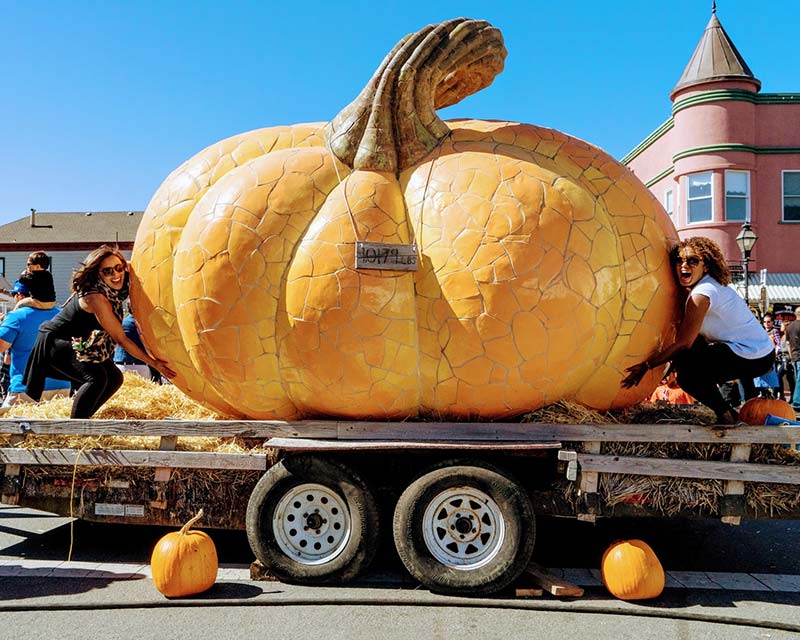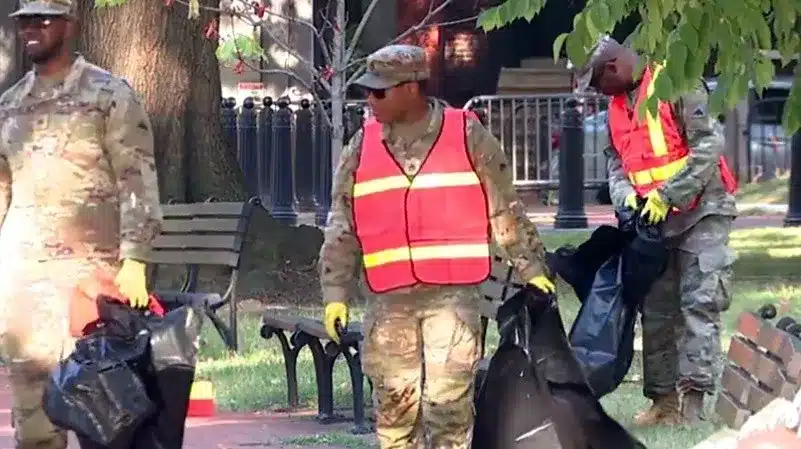It’s Time to Call Out the National Gourd
Watching the members of the National Guard being deployed in DC has been . . . painful. I’m not talking about the assault on democracy, as bad as that is, but the toll this deployment must be taking on the members of the Guard themselves. As a pastor, I’ve had countless members of the National Guard in my congregations. They’re the modern version of the Minutemen, practicing on the weekends every so often, ready to go at a moment’s notice when the need arises. And when the need passes, they go home.
Now imagine that you are one of these members of the Guard who has been deployed in DC, and you’re about to head back home. Then imagine the conversation you’re going to have with your kid . . .
Kid: Dad, what happened on your deployment?
Dad (looking down at his feet): Oh, you know. We went and did our thing, then came home.
Kid: How many terrorists did you shoot?
Dad: It wasn’t that kind of mission.
Kid: Did you blow up somebody’s headquarters?
Dad: Uh, no.
Kid: Then what *did* you do? Is it so secret you can’t tell me?
long pause
Dad (leaning in really close, and whispering): If I tell you, you can’t tell anyone. Promise?
Kid (excited): Promise!
Dad (dramatically looking left and right, to see who might be listening): We picked up . . . trash.
long pause as the Kid looks at Dad
Kid (grinning): Ok, you got me. Seriously, what did you do?
Dad: I’m serious. We. Picked. Up. Trash.
Kid (grin fades to a frown): Trash? Like you put on a day-glo orange vest over your camo uniforms and scooped up water bottles and french fry cups?
Dad: Yeah. And remember, you promised not to tell anyone about this.
Kid: Don’t worry – no one would believe me. And if they did, they’d all laugh at me all day long if they found out. Your secret is safe with me.
Seriously. This makes Alice’s Restaurant and its Group W bench look like nothing. “Son, are you manly enough and lethal enough to pick up trash?”
Trump did this for the symbolism. He did it to make it look as if he is Strong On . . . something. Whatever it is, he’s Strong, and calling out the National Guard is how he shows it. “Look at me, and how Important and Powerful I am. I, only I, the Greatest President in history, can do this!”
In response, there are all kinds of very serious, very appropriate ways to fight back against this. Mayors and governors are filing lawsuits, and working hard to keep this from happening again. Good. Do it, again and again and again. Pundits are punditing, and historians are describing how unprecedented this all it. Fine. These are necessary parts of a response, but they are not a sufficient response. No, the fullness of a response needs to take Trump on on the battlefield of symbolism, turning his desire to project power into a punch line.
As I’ve pondered this, it suddenly hit me. My friends, it is time to call out the National Gourd. I’m talking pumpkins.
 Imagine a bunch of tourists marching east from the Lincoln Memorial with their pumpkins held high, marching past the Vietnam Veterans Memorial, the MLK Jr. memorial, the reflecting pool, the Korean War memorial, and the WWII memorial. Meanwhile, at the other end of the Mall, imagine another bunch of tourists with pumpkins marching west from the Capitol. Imagine them marching past the National Museum of the American Indian, the Air and Space Museum, and the National Museum of African American History and Culture. Imagine these two groups meeting, with their pumpkins held high, at the Washington Monument, then turning north.
Imagine a bunch of tourists marching east from the Lincoln Memorial with their pumpkins held high, marching past the Vietnam Veterans Memorial, the MLK Jr. memorial, the reflecting pool, the Korean War memorial, and the WWII memorial. Meanwhile, at the other end of the Mall, imagine another bunch of tourists with pumpkins marching west from the Capitol. Imagine them marching past the National Museum of the American Indian, the Air and Space Museum, and the National Museum of African American History and Culture. Imagine these two groups meeting, with their pumpkins held high, at the Washington Monument, then turning north.
Toward the White House.
Imagine the fence around the White House suddenly surrounded by the National Gourd, as the tourists deposit their pumpkins on the sidewalks around Trump’s doorstep.
Imagine the National Gourd appearing along the mansions of Embassy Row.
Imagine the National Gourd filling Lafayette Square, just north of the White House.
Imagine the National Gourd appearing at Blair House, at the US Naval Observatory (home to JD Vance), and on the steps of SCOTUS.
Imagine the National Gourd appearing at the DC Armory, home to the DC National Guard.
Imagine the National Gourd appearing all over DC. Imagine DC businesses putting a member of the National Gourd at their doors and in their windows. Imagine Metro Stations with their own National Gourd presence. Imagine the National Gourd lining The Wall at the Vietnam Memorial. Imagine the National Gourd sitting at the feet of every soldier in the Korean War Memorial. Imagine the National Gourd alongside every figure in the FDR Memorial. Imagine the National Gourd appearing at Dulles Airport and at DC (aka Reagan) National Airport. Imagine the National Gourd appearing at Langley, the Pentagon, and the FBI headquarters.
Imagine the National Gourd showing up at Mar-a-Lago in Florida, Trump Tower in New York, and Trump’s Bedminster golf course in New Jersey.
And then imagine the National Gourd showing up at the Great Lakes Naval Station outside of Chicago, to greet the folks Trump is apparently going to send there.
Imagine the National Gourd appearing at federal buildings and offices around the country. Agricultural extension offices, military recruiting centers, federal courthouses, and post offices. Navy bases and Air Force bases and Army bases and Marine bases. National park entrances and IRS buildings and ICE offices. Imagine a member of the National Gourd showing up at every federal facility in the country.
Call out the National Gourd, and make Trump weep.
This past week, a certain coffee chain released their annual chemical pumpkin-based weapon: the pumpkin spice latte. All around the country, pumpkin-based artillery units are holding their annual “Punkin Chunkin” events (see here or here or here or here for examples), where trebuchets, catapults, and other devices launch pumpkins enormous distances (unless the pumpkin explodes in mid-air, known as “pumpkin pie”). [If you want to see more, google “punkin chunkin”] The world championships used to be broadcast on various television stations, but perhaps the powers that be realized that they were disclosing military secrets and the broadcasts have ceased in recent years. Even so, these are the regular training events for the National Gourd.
And then there’s the Half Moon Bay Art and Pumpkin Festival.
In six weeks, the little town of Half Moon Bay, California, population 11,795, will be transformed from a sleepy little coastal village to become the epicenter of Pumpkinism as around 200,000 folks come to town for their annual Half Moon Bay Art and Pumpkin Festival.
200,000 people line the streets for a grand parade, and it is the pumpkin equivalent of the USSR’s May Day parades in Red Square, where missiles and tanks were paraded before the  Soviet Politburo. In Half Moon Bay, the highlight of the parade is the Mother of All Pumpkins, as growers from all over bring their best to Half Moon Bay, hoping to be crowned the biggest and the best. We’re talking pumpkins in excess of 1000 pounds. When I lived in the Bay Area, the Half Moon Bay Pumpkin Festival was an annual pilgrimage.
Soviet Politburo. In Half Moon Bay, the highlight of the parade is the Mother of All Pumpkins, as growers from all over bring their best to Half Moon Bay, hoping to be crowned the biggest and the best. We’re talking pumpkins in excess of 1000 pounds. When I lived in the Bay Area, the Half Moon Bay Pumpkin Festival was an annual pilgrimage.
This is the parade that Trump wanted for his birthday, and never got.
We are approaching peak pumpkin season, and along with all the serious lawsuits and punditry, maybe the National Gourd can help take Trump’s ego down a notch or two. In a publicity contest between the National Guard and the National Gourd, I’ll bet on the Gourd every day and twice on Sundays. Especially in September and October.
Oh, and while we’re chatting . . .
Like many such events, the Half Moon Bay Art and Pumpkin Festival did not happen during COVID. Even so, the festival made their usual contributions to a bunch of local organizations, as if the festival had continued as usual. While this kept those groups afloat, it hurt the finances of the festival hard. Last April, local media reported that their own sustainability was in jeopardy. This is an amazing local festival, and if you are so inclined, you can help them out here.
Seriously. This is an incredible event, and they can use all the help they can get.




